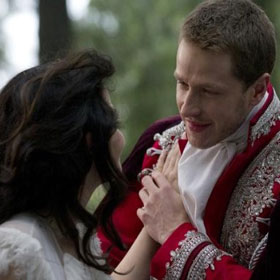Once Upon A Time

3.5/5
Maybe it’s kickback from all the reality programming that has littered television for the past decade, or maybe it’s a reaction to the economy – a sort of escapist ideology – but there are a lot of fantasy-based shows hitting the airwaves this fall. We are seeing the return of lauded series such as The Walking Dead and Game of Thrones, but also the premiere of groundbreaking shows such as Terra Nova and Grimm. Drawing a close parallel to NBC’s Grimm, but the first of the two out of the gate, is ABC’s Once Upon A Time.
Set in two worlds – one of literary fantasy and one of reality – Once Upon A Time tries to fit the characters we grew up with and came to love into the context of our modern day lives. Tries being the operative word here. The story goes like this: the show opens with the familiar kiss from Prince Charming, you know, the one that awakens Snow White from her poisoned apple induced coma. Magic shoots through the trees and the fabled happy ending looks to be in sight. From there Once Upon A Time creates a mish-mash of fairytale character. We see the entire enchanted forest turn out for the marriage of Snow White and Charming, only for the event to be interrupted by the obligatory Evil Queen, who in true bitchy, evil fashion curses the entire party to a world where their one want and desire – said happy ending – can never be obtained.
I have to give it to Queenie. The curse is pretty original. After all, what can be more painful than having to spend eternity in a sleepy New England town where time doesn’t pass, and worse, not even knowing you’ve been cursed. This is the primary premise for Once. Every fairy tale character has been sent to Storybrook, Maine, and given a modern doppelgänger; Jiminy Cricket is now a psychiatrist, Rumpelstiltskin is the local extortionist, Gepetto is the jailer, Grumpy the town drunk, Queenie the major, while Snow White aptly plays the gentle school teacher and her Prince Charming lies (in an interesting twist) in the hospital, a comatose John Doe. The problem is, none of these characters are aware of their former selves, and that’s the real kicker of the curse. If any of them should try to leave the town, why, terrible things would happen, of course.
Luckily, one person is in on the cruel (?) joke. Little Henry, in all his foppishness recalling Dewy from Malcolm in the Middle, has managed to escape Storybrook in a Greyhound bus and makes his way to Boston in search of his biological mother, Emma, who is Snow White’s daughter and also the only one to escape the Queen’s curse. Whoever thought Snow White’s daughter would grow up to be a lonely and cynical bounty hunter is all right with us. We’re introduced to Emma dropping the hammer on some sleazy deadbeat (“Well, you’re the sexiest orphan I know”) while the Black Keys plays in the background. We're down with that. When Henry shows up at Emma’s apartment one particularly pensive night and breaks the news that he is her son, given up at birth for adoption, and that now he needs her help to break some curse, no one’s surprised when Emma acts a little skeptical.
So a reluctant Emma drives Henry back to Storybrook under the assumption that she’s returning the nutter back to his legal guardian, one Evil Queen. Once there she’s introduced to a litany of strange characters. When a mysterious wolf thwarts her exodus from town and the Queen threatens her, Emma decides to stay for a week just to see what she can see. You know, feel things out. The frozen town clock ticks into motion and from there, the series takes off. Simple.
A lot of early commentary has said that Once Upon A Time is either not dark enough or not light enough. We could care less how heavy Once intends itself to be. For us, these types of shows are standard fare, and by types we mean dramatic situations with a touch of the magical. We could go both ways and we take what we're given. If Once can keep us tuning in for an entire season, then it’s done a good job. The style with which the show handles its fantasy is a matter of secondary importance. Or at least, that’s how we feel about this one show in particular. We’ll buy the conceit the show is selling, as familiar as it sounds sometimes, and the eye-popping visuals don’t hurt. And the more we think about it, the more we become tired with the darkening of things and equally put off by the syrupy sweet. So long as the show focuses on taught storytelling and interesting conflicts we're okay.
RELATED ARTICLES
Get the most-revealing celebrity conversations with the uInterview podcast!





Leave a comment